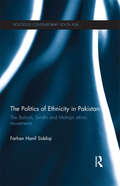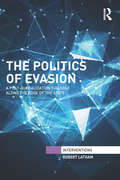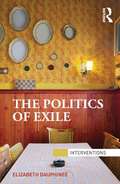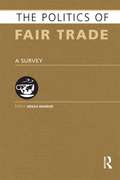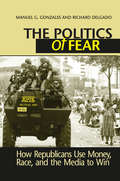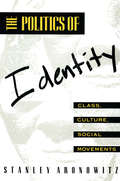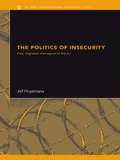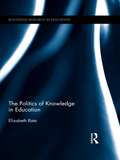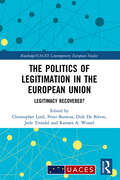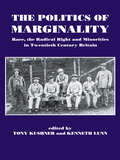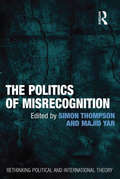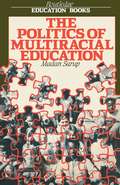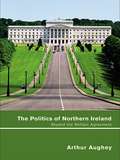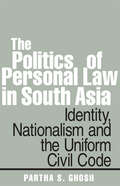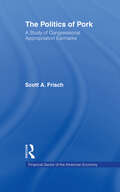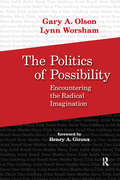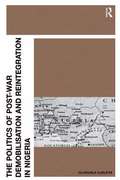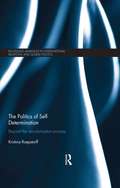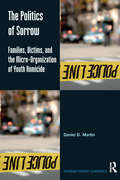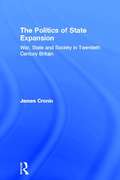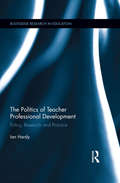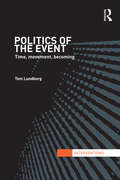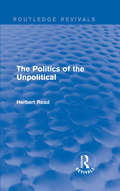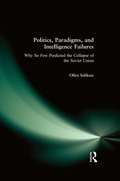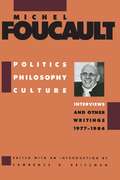Special Collections
Benetech’s Global Certified Accessible Titles
Description: Benetech’s GCA program is the first independent third-party EPUB certification to verify ebook accessibility. By creating content that is born accessible, publishers can meet the needs of all readers. Learn more: https://bornaccessible.benetech.org/
- Table View
- List View
The Politics of Ethnicity in Pakistan
by Farhan Hanif SiddiqiIn order to understand the Pakistani state and government’s treatment of non-dominant ethnic groups after the failure of the military operation in East Pakistan and the independence of Bangladesh, this book looks at the ethnic movements that were subject to a military operation after 1971: the Baloch in the 1970s, the Sindhis in the 1980s and Mohajirs in the 1990s. The book critically evaluates the literature on ethnicity and nationalism by taking nationalist ideology and the political divisions which it generates within ethnic groups as essential in estimating ethnic movements. It goes on to challenge the modernist argument that nationalism is only relevant to modern-industrialised socio-economic settings. The available evidence from Pakistan makes clear that ethnic movements emanate from three distinct socio-economic realms: tribal (Baloch), rural (Sindh) and urban (Mohajir), and the book looks at the implications that this has, as well as how further arguments could be advanced about the relevance of ethnic movements and politics in the Third World. It provides academics and researchers with background knowledge of how the Baloch, Sindhi and Mohajir ethnic conflict in Pakistan took shape in a historical context as well as probable future scenarios of the relationship between the Pakistani state and government, and ethnic groups and movements.
The Politics of Evasion
by Robert LathamBurgeoning national security programs; thickening borders; Wikileaks and Anonymous; immigrant rights rallies; Occupy movements; student protests; neoliberal austerity; global financial crises – these developments underscore that the fable of a hope-filled post-cold war globalization has faded away. In its place looms the prospect of states and corporations transforming a permanent war on terror into a permanent war on society. How, at the critical juncture of a post-globalization era, will policymakers and power-holders in leading states and corporations of the Global North choose to pursue power and control? What possibilities and limits do activists and communities face for progressive political action to counter this power inside and outside the state? This book is a sustained dialogue between author and political theorist, Robert Latham and Mr. V, a policy analyst from a state in the Global North. Mr. V is sympathetic to the pursuit of justice, rights and freedom by activists and movements but also mindful of the challenges of states in pursuing security and order in the current social and political moment. He seeks a return to the progressive, welfare-oriented state associated with the twentieth century. The dialogue offers an in-depth consideration of whether this is possible and how a progressive politics might require a different approach to social organization, power and collective life. Exploring key ideas, such as sovereignty, activism, neoliberalism, anarchism, migration, intervention, citizenship, security, political resistance and transformation, and justice, this book will be of interest to academics and students of Political Science, Sociology, Anthropology, Law, Geography, Media and Communication, and Cultural Studies.
The Politics of Exile
by Elizabeth Dauphinee"The most thought-provoking and refreshing work on Bosnia and the former Yugoslavia in a long time.It is certainly an immense contribution to the broadening schools within international relations." Times Higher Education (THE). Written in both autoethnographical and narrative form, The Politics of Exile offers unique insight into the complex encounter of researcher with research subject in the context of the Bosnian War and its aftermath. Exploring themes of personal and civilizational guilt, of displaced and fractured identity, of secrets and subterfuge, of love and alienation, of moral choice and the impossibility of ethics, this work challenges us to recognise pure narrative as an accepted form of writing in international relations. The author brings theory to life and gives corporeal reality to a wide range of concepts in international relations, including an exploration of the ways in which young academics are initiated into a culture where the volume of research production is more valuable than its content, and where success is marked not by intellectual innovation, but by conformity to theoretical expectations in research and teaching. This engaging work will be essential reading for all students and scholars of international relations and global politics.
The Politics of Fair Trade
by Meera WarrierThe Politics of Fair Trade is a brand new title that explores the current issues in fair trade, featuring in-depth analysis by the leading experts in this field. Edited by Meera Warrier, this exciting title boasts case studies of the key commodities involved in fair trade issues, plus an A-Z of entries dealing with issues, organizations, disputes, and relevant countries with regard to fair trade.
Politics of Fear
by Richard Delgado and Manuel G. Gonzales"Lucidly written, widely informed, and uncompromisingly honest -- a valuable expose." Michael Parenti "Documents the stunning success of a network of wealthy donors and corporations in creating and sustaining a set of think tanks, legal action groups, and media strategies." Gary Orfield, Harvard University What explains the electoral success of Republicans, particularly of the ascendant neoconservatives who now dominate the Party? Based on a thorough and up-to-date examination of the New Right over twenty-five years, The Politics of Fear proposes some provocative answers, including globalization, new technologies, and a far-reaching network of right-wing think tanks and foundations. As the authors show, all have opened the doors to a new politics of fear successfully waged by the neoconservatives. By manipulating insecurity, the New Right has created an extraordinarily successful populist conservative movement. Utilizing extensive documentation, the authors argue convincingly that the fear of immigrants and racial minorities has served as the most effective tactic in the GOP arsenal, while their approach also implicates gays, feminists, and terrorists. The book explains why Americans have willingly supported a party that promises them security, just as it delivers greater economic and political insecurity. The authors argue that, despite their striking political successes, neoconservatives have delivered to voters a set of policies harmful to working Americans in the way of regressive tax measures, military exploits, tort reform, deregulation, and environmental destruction.
The Politics of Identity
by Stanley AronowitzIn The Politics of Identity, Stanley Aronowitz offers provocative analysis of the complex interactions of class, politics, and culture. Beginning with the premise that culture is constitutive of class identities, he demonstrates that while feminist analyses of both racial and gay movements have discussed these components of culture, class contributions to cultural identity have yet to be fully examined. In these essays, he uses class as a category for cultural analysis, ranging over issues of ethnicity, race and gender, portrayals of class and culture in the media, as well as a range of other issues related to postmodernism.
The Politics of Insecurity
by Jef HuysmansThe act of violence of 9/11 changed the global security agenda, catapulting terrorism to the top of the agenda. Weapons of mass destruction grabbed public interest and controlling the free movement of people became a national security priority. In this volume, Jef Huysmans critically engages with theoretical developments in international relations and security studies to develop a conceptual framework for studying security. He argues that security policies and responses do not appear out of the blue, but are part of a continuous and gradual process, pre-structured by previous developments. He examines this process of securitization and explores how an issue, on the basis of the distribution and administration of fear, becomes a security policy. Huysmans then applies this theory to provide a detailed analysis of migration, asylum and refuge in the European Union. This theoretically sophisticated, yet accessible volume, makes an important contribution to the study of security, migration and European politics.
The Politics of Knowledge in Education
by Elizabeth RataThis book explores the decline of the teaching of epistemic, conceptual knowledge in schools, its replacement with everyday social knowledge, and its relation to changes in the division of labor within the global economy. It argues that the emphasis on social knowledge in postmodern and social constructionist pedagogy compounds the problem, and examines the consequences of these changes for educational opportunity and democracy itself.
The Politics of Legitimation in the European Union
by Christopher LordThis book examines and investigates the legitimacy of the European Union by acknowledging the importance of variation across actors, institutions, audiences, and context. Case studies reveal how different actors have contributed to the politics of (re)legitimating the European Union in response to multiple recent problems in European integration. The case studies look specifically at stakeholder interests, social groups, officials, judges, the media and other actors external to the Union. With this, the book develops a better understanding of how the politics of legitimating the Union are actor-dependent, context-dependent and problem-dependent. This book will be of key interest to scholars and students of European integration, as well as those interested in legitimacy and democracy beyond the state from a point of view of political science, political sociology and the social sciences more broadly.
The Politics of Marginality
by Tony Kushner and Kenneth LunnImmigration to Britain has rarely achieved the levels experienced by the US, but it is nevertheless true of all periods that immigrants, refugees and soujourners have been continually present'. While we may have the beginnings of a history of immigration, ethnicity and race in Britain, there is a lack of historiographical awareness in the subject. The essays in this collection, ranging from specific case studies to broad themes, are an attempt to provide a basis for future discussion.
The Politics of Misrecognition
by Majid YarThe past several decades have seen the emergence of a vigorous ongoing debate about the 'politics of recognition'. The initial impetus was provided by the reflections of Charles Taylor and others about the rights to cultural recognition of historically marginalized groups in Western societies. Since then, the parameters of the debate have considerably broadened. However, while debates about the politics of recognition have yielded significant theoretical insights into recognition, its logical and necessary counterpart, misrecognition, has been relatively neglected. 'The Politics of Misrecognition' is the most meticulous reflection to date on the importance of misrecognition for the understandings of our political and personal experience. A team of leading experts from a range of disciplines, including philosophy, political theory, sociology, psychoanalysis, history, moral economy and criminology present different theoretical frameworks in which the politics of misrecognition may be understood. They apply these frameworks to a wide variety of contexts, including those of class identity, disability, slavery, criminal victimization and domestic abuse. In this way, the book provides an essential resource for anyone interested in the dynamics of misrecognition and their implications for the development of political and social theory.
The Politics Of Multiracial Education
by Madan SarupIn this book Madan Sarup describes recent developments in multi-racial education and makes a sustained critique of approaches based on the assumptions of psychology, 'equality of opportunity' and 'cultural pluralism'.
The Politics of Northern Ireland
by Arthur AugheyIn this book, one of the leading authorities on contemporary Northern Ireland politics provides an original, sophisticated and innovative examination of the post-Belfast agreement political landscape. Written in a fluid, witty and accessible style, this book explores: how the Belfast Agreement has changed the politics of Northern Ireland whether the peace process is still valid the problems caused by the language of politics in Northern Ireland the conditions necessary to secure political stability the inability of unionists and republicans to share the same political discourse the insights that political theory can offer to Northern Irish politics the future of key political parties and institutions.
The Politics of Personal Law in South Asia
by Partha S. GhoshIt is a political study of the controversy surrounding the issue of the uniform civil code vis-à-vis personal laws from a South Asian perspective. At the centre of the debate is whether there should be a centralized view of the legal system in a given society or a decentralized view, both horizontally and vertically. This issue is entangled within the threads of identity politics, minority rights, women’s rights, national integration, global Islamic politics and universal human rights. Champions of each category view it through their own prisms, making the debate extremely complex, especially in politically and socially plural South Asia. So, this book attempts to harmonize the threads of the debate to provide a holistic political analysis.
The Politics of Pork
by Scott A. FrischThis study develops a new way of studying pork barrel politics based on congressional behavior in the 1980s and 1990s.
Politics of Possibility
by Henry A. Giroux and Gary A. Olson and Lynn WorshamIn the probing interviews in this vibrant new book, eminent scholars struggle with some of the most crucial issues facing contemporary intellectuals. Poststructuralist philosopher Judith Butler discusses the pain of rigorous intellectual work, saying that it is necessarily extremely hard labor, as she examines the intersection of discourse and political action. Award-winning filmmaker, philosopher, and social theorist David Theo Goldberg reviews his life s work, especially on issues of racism. Literary critic and feminist philosopher Avital Ronell sets out to disrupt the standard logic of signification, to force readers into fresh ways of perceiving a subject at hand. Postcolonial theorist Homi Bhabha discusses how critical literacy is intimately connected to the question of democratic representation, and he elaborates on how cultural difference can lead to a politics of discrimination. And neo-Marxist cultural critic Slavoj i ek takes readers on an exhilarating journey through a wide range of critical subjects."
The Politics of Post-War Demobilisation and Reintegration in Nigeria
by Olukunle OjeleyeWith an increasing international interest in post civil war demobilisation and reintegration, especially in Africa, Ojeleye presents a well timed body of knowledge on the Nigerian civil war. Moreover, this book provides an in-depth study of the modalities and processes of the demobilisation and reintegration exercises carried out at the end of the Nigerian civil war and assesses their implications for national politics in the West African nation. The author identifies the political, socio-economic and cultural background to the Nigerian civil war and discusses the central theme of demobilisation, disarmament and reintegration (DDR) in Nigeria against the backdrop of the policy of the country's post war reconstruction, reconciliation and rehabilitation exercise (the 3Rs). Though the central theme is Nigeria, it compares the demobilisation and reintegration exercise in Nigeria with other attempts in Sub Sahara Africa by highlighting the important deviations and drawing some conclusions on the Nigerian experience. It also touches on issues relating to international involvement and intervention in civil wars and the roles of the African Union, the Commonwealth of Nations and the United Nations.
The Politics of Self-Determination
by Kristina RoepstorffSince the formation of the UN in 1945 the international community has witnessed a number of violent self-determination conflicts such as the disintegration of Yugoslavia, Chechnya, Kashmir, and South Sudan that have been a major cause of humanitarian crises and destruction. This book examines the scope and applicability of political self-determination beyond the decolonisation process. Explaining the historical evolution of self-determination, this book provides a theoretical examination of the concept and background. Taking an interdisciplinary approach, the author analyses self-determination in relation to contemporary conflicts, which inform and drive a coherent theoretical framework for international responses to claims for self-determination. Built upon an examination of the conceptual foundations of self-determination, this book presents a new understanding and application of self-determination. It addresses the important question of whether self-determination claims legitimate armed violence, either by the self-determining group’s right to rebel, or by the international community in the form of humanitarian intervention. The Politics of Self-Determination will be of interest to students and scholars of political science, international relations, security studies and conflict studies.
The Politics of Sorrow
by Daniel D. MartinDrawing on several years of research with grief support organizations and the families and friends of murdered children, this book examines the emotional experience of families in the aftermath of a homicide. It examines the politics of sorrow, offering a comparative analysis of White and African-American families as they navigate the experience of homicide, shedding light on the ways in which the class location or ethnicity of mourners affects their experience. Analyzing the manner in which police and other authorities differentially extend emotional support to bereaved families, notify them of a homicide, or assign blame, The Politics of Sorrow reveals how 'disenfranchised grief' comes to be an institutionalized outcome of their practice. The book further examines the effects of 'announcement shock' and the importance to the family of the moral career of the deceased, as they seek to manage his or her identity, often dealing with their grief through an active pursuit of justice in court, or through political involvement with a grief support organization, which mobilizes families in pursuit of its political ends. A rigorous study of stigma, identity, and stratified experiences of grief, The Politics of Sorrow will appeal to sociologists interested in interactionist methods, race, class, and emotion.
The Politics of State Expansion
by James CroninThe expansion of the British state was neither automatic nor accidental. Rather, it was the outcome of recurring battles over the proper boundaries of the state and its role in economy and society. The Politics of State Expansion focuses on the interests arrayed on either side of this struggle; providing a new and critical perspective on the growth of the `Keynsian welfare state' and on the more recent retreat from Keynes and from collective provision.
The Politics of Teacher Professional Development
by Ian HardyThe Politics of Teacher Professional Development: Policy, Research and Practice provides innovative insights into teachers’ continuing development and learning in contemporary western contexts. Rather than providing a list of "how-tos" and "must dos," this volume is premised on the understanding that by learning more about the current conditions under which teachers and other educators work and learn, it is possible to understand, and consequently improve, the learning opportunities teachers experience. Teacher professional development is not simply construed as an isolated series of events, such as day-long workshops marking the beginning of each school year or term, or individualistic "one-off" activities focused on new teaching approaches, curricula or assessment strategies. Rather, through application of sociologist Pierre Bourdieu’s understanding of social practices as contested, teacher professional development is revealed as a complex social practice which exists as policy, as a research product and process, and as an important part of teachers’ work. The book reveals how PD as policy, research and teachers’ work are inherently contested. An extended series of case studies of teacher professional development practices from Canada, England and Australia are employed to show how these tensions play out in complex ways in policy and practice.
Politics of the Event
by Tom LundborgDespite occupying a central role and frequently being used in the study of international politics, the concept of the "event" remains in many ways unchallenged and unexplored. By combining the philosophy of Gilles Deleuze and his concept of the event with the example of 9/11 as an historical event, this book problematises the role and meaning of "events" in international politics. Lundborg seeks to demonstrate how the historical event can be analysed as a practice of inscribing temporal borders and distinctions. Specifically he shows how this practice relies upon an ongoing process of capturing various movements – of thought, sense, experience and becoming. However the book also demonstrates how these same movements express a life and reality that elude complete capture, highlighting the potential for alternative encounters with the event, encounters that constantly threaten to undermine the limits and imaginary completeness of the historical event. This book offers an exciting new way of thinking about the politics of encountering events, arguing that at the heart of such encounters there are always elements of uncertainty and contingency that cannot be fully resolved or fixed. It will be of great interest to students and scholars of international relations, cultural studies and history.
The Politics of the Unpolitical
by Herbert ReadIn this collection of fourteen essays, first published in 1943, Herbert Read extends and amplifies the points of view expressed in his successful pamphlet To Hell with Culture, which has been reprinted here. The ‘politics of the unpolitical’ are the politics of those who strive for human values and not for national or sectional interests. Herbert Read defines these values and demands their recognition as a solvent of social and cultural crises’, and looks forward to the future with constructive vision. This book will be of interest to students of politics, history, and philosophy.
Politics, Paradigms, and Intelligence Failures
by Ofira SeliktarWashington's failure to foresee the collapse of its superpower rival ranks high in the pantheon of predictive failures. The question of who got what right or wrong has been intertwined with the deeper issue of "who won" the Cold War. Like the disputes over "who lost" China and Iran, this debate has been fought out along ideological and partisan lines, with conservatives claiming credit for the Evil Empire's demise and liberals arguing that the causes were internal to the Soviet Union. The intelligence community has come in for harsh criticism for overestimating Soviet strength and overlooking the symptoms of crisis; the discipline of "Sovietology" has dissolved into acrimonious irrelevance. Drawing on declassified documents, interviews, and careful analysis of contemporaneous literature, this book offers the first systematic analysis of this predictive failure at the paradigmatic, foreign policy, and intelligence levels. Although it is focused on the Soviet case, it offers lessons that are both timely and necessary.
Politics, Philosophy, Culture
by Michel FoucaultPolitics, Philosophy, Culture contains a rich selection of interviews and other writings by the late Michel Foucault. Drawing upon his revolutionary concept of power as well as his critique of the institutions that organize social life, Foucault discusses literature, music, and the power of art while also examining concrete issues such as the Left in contemporary France, the social security system, the penal system, homosexuality, madness, and the Iranian Revolution.
